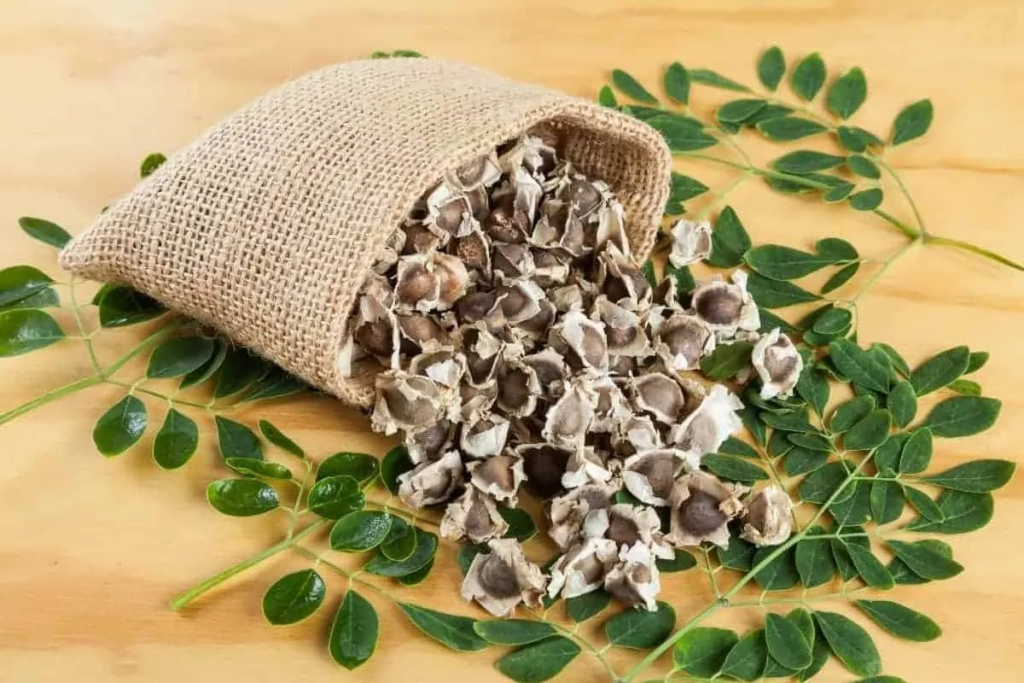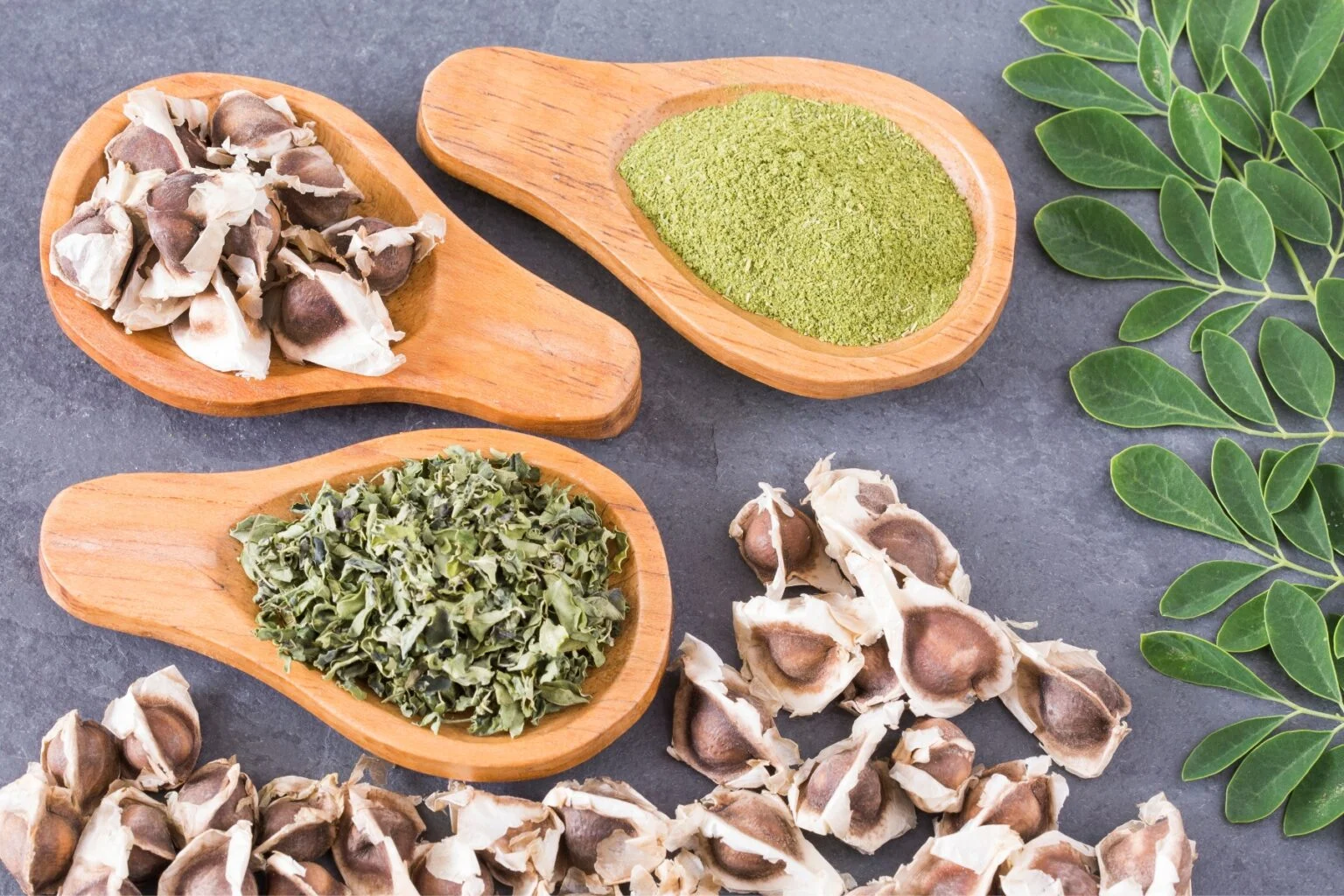Moringa oleifera, commonly known as the drumstick tree, horseradish tree, or ben oil tree, is a plant that has gained immense popularity for its incredible nutritional and medicinal properties. Native to the Indian subcontinent, moringa is now cultivated in various parts of the world. Its seeds, in particular, are renowned for their versatility and numerous health benefits. This blog post delves deep into the benefits and uses of moringa seeds, exploring how they can enhance health and well-being.
Nutritional Profile of Moringa Seeds
Moringa seeds are a nutritional powerhouse, loaded with essential vitamins and minerals. Key nutrients found in moringa seeds include:
- Vitamin A: Essential for vision, immune function, and skin health.
- Vitamin B: Important for energy metabolism and cognitive function.
- Vitamin C: An antioxidant that boosts the immune system and promotes skin health.
- Vitamin E: Protects cells from oxidative stress and supports skin health.
- Calcium: Crucial for bone health and muscle function.
- Potassium: Helps regulate blood pressure and fluid balance.
- Iron: Vital for the formation of hemoglobin and oxygen transport in the blood.
- Magnesium: Supports muscle and nerve function, as well as energy production.
- Zinc: Important for immune function, wound healing, and DNA synthesis.
Health Benefits of Moringa Seeds
1. Antioxidant Properties
Moringa seeds are rich in antioxidants, which are compounds that help neutralize free radicals in the body. Free radicals are unstable molecules that can cause oxidative stress, leading to cellular damage and contributing to chronic diseases such as cancer, heart disease, and diabetes. The antioxidants in moringa seeds, including vitamin C and flavonoids, help protect cells from damage and support overall health.
2. Anti-Inflammatory Effects
Chronic inflammation is a major contributor to various health conditions, including arthritis, cardiovascular diseases, and certain cancers. Moringa seeds contain anti-inflammatory compounds such as isothiocyanates, which have been shown to reduce inflammation in the body. These compounds help alleviate symptoms of inflammatory conditions and support overall health.
3. Blood Sugar Regulation
Moringa seeds have been found to help regulate blood sugar levels, making them beneficial for individuals with diabetes. Studies have shown that moringa seed extracts can improve insulin sensitivity and lower blood sugar levels. This effect is attributed to the high fiber content and the presence of compounds such as isothiocyanates and chlorogenic acid, which help regulate glucose metabolism.
4. Heart Health
The cardiovascular benefits of moringa seeds are significant. They contain high levels of potassium, which acts as a vasodilator, helping to relax blood vessels and reduce blood pressure. Additionally, the antioxidants and anti-inflammatory properties of moringa seeds help prevent oxidative damage to the heart and arteries, reducing the risk of heart disease.
5. Immune System Support
Moringa seeds are a great source of vitamins and antioxidants that boost the immune system. Vitamin C, in particular, enhances the function of immune cells and improves the body’s ability to fight off infections and diseases. Regular consumption of moringa seeds can help strengthen the immune system and promote overall health.
6. Skin and Hair Health
The benefits of moringa seeds extend to skin and hair health. They are rich in vitamins A and E, which are essential for maintaining healthy skin and hair. Vitamin A promotes the repair and maintenance of skin tissues, while vitamin E acts as an antioxidant that protects skin cells from damage. Moringa oil, extracted from the seeds, is widely used as a natural moisturizer to hydrate and nourish the skin, reducing the appearance of wrinkles and fine lines. The oil also supports hair health by preventing dryness and promoting scalp health.
7. Weight Management
The high fiber content in moringa seeds promotes a feeling of fullness, which can help control appetite and reduce overall calorie intake. This makes moringa seeds an effective aid in weight management. Additionally, the seeds’ nutrient profile supports metabolic health, which is crucial for maintaining a healthy weight. Regular consumption of moringa seeds can help in managing weight and preventing obesity.
8. Digestive Health
Moringa seeds support digestive health due to their high fiber content. Fiber aids in digestion by promoting regular bowel movements and preventing constipation. The seeds also have mild laxative properties, which can help cleanse the digestive tract and improve gut health. Additionally, the antimicrobial properties of moringa seeds help maintain a healthy balance of gut bacteria.
Uses of Moringa Seeds
1. Water Purification
One of the most remarkable uses of moringa seeds is their ability to purify water. The seeds contain a natural coagulant that can bind to impurities and bacteria, causing them to settle and making the water clearer and safer to drink. This natural purification process is particularly valuable in areas with limited access to clean drinking water. Moringa seeds can be crushed into a powder and added to contaminated water, where they act as a natural flocculant, removing suspended particles and pathogens.

2. Culinary Uses
Moringa seeds can be consumed in various ways. They can be eaten raw, roasted, or cooked, and are often added to soups, stews, and salads. The seeds can also be ground into a powder and used as a seasoning or supplement. Here are some common culinary uses:
- Raw: Fresh moringa seeds can be eaten raw. They have a slightly sweet and nutty flavor.
- Roasted: Roasting moringa seeds enhances their flavor and makes them a crunchy snack.
- Cooked: Moringa seeds can be cooked and added to dishes such as soups, stews, and curries.
- Powdered: Moringa seed powder can be sprinkled on salads, added to smoothies, or used as a seasoning in various dishes.
3. Cosmetic Industry
Moringa seed oil is a popular ingredient in the cosmetic industry due to its hydrating and nourishing properties. The oil is used in various skincare products, including moisturizers, lotions, and serums, to hydrate and rejuvenate the skin. It is also used in hair care products to promote healthy hair and prevent dryness and breakage. The anti-inflammatory and antioxidant properties of moringa oil make it an excellent addition to beauty products aimed at reducing signs of aging and improving skin health.
4. Traditional Medicine
In traditional Ayurvedic medicine, moringa seeds are used to treat a variety of ailments, including digestive disorders, inflammation, and skin conditions. They are considered a rejuvenating herb that promotes overall health and longevity. Moringa seeds are used in various forms, including powders, extracts, and oils, to harness their medicinal properties and improve health outcomes.
5. Sustainable Agriculture
Moringa trees are easy to grow and can thrive in a variety of soil types, making them a sustainable crop for small farmers. They require minimal water and can be harvested multiple times a year, providing a reliable source of income and nutrition. Moringa trees also contribute to soil health by preventing erosion and improving soil fertility. The extensive root system of the moringa tree helps stabilize the soil, reducing the risk of erosion and promoting sustainable agricultural practices.
Environmental Benefits
1. Soil Erosion Prevention
Moringa trees have extensive root systems that help prevent soil erosion by stabilizing the soil and reducing runoff. This makes them an excellent choice for planting in erosion-prone areas to maintain soil health and fertility. The leaves and seeds of the moringa tree can also be used as green manure to enrich the soil with essential nutrients.
2. Sustainable Agriculture
Moringa trees are highly resilient and can grow in a variety of soil conditions, including poor and arid soils. They require minimal water and can withstand drought conditions, making them a sustainable crop for small farmers in developing regions. The tree’s ability to produce leaves, seeds, and pods throughout the year provides a continuous source of nutrition and income for farmers. Additionally, the cultivation of moringa trees supports biodiversity and improves the resilience of agricultural ecosystems.
Side Effects and Precautions
While moringa seeds offer numerous health benefits, it is important to consume them in moderation. Excessive consumption of moringa seeds can lead to side effects such as nausea, vomiting, and gastrointestinal discomfort. Pregnant and breastfeeding women should consult with a healthcare provider before incorporating moringa seeds into their diet, as there is limited research on their safety during pregnancy and lactation. Additionally, individuals with underlying health conditions or those taking medications should seek medical advice before using moringa seeds as a supplement.
Conclusion
Moringa seeds are a versatile and nutrient-dense superfood that offers a wide range of health benefits and practical uses. From their antioxidant and anti-inflammatory properties to their ability to regulate blood sugar and support heart health, moringa seeds are a valuable addition to any diet. Their culinary versatility and applications in traditional medicine, cosmetics, and sustainable agriculture further highlight their importance. Incorporating moringa seeds into your daily routine can lead to improved health, enhanced beauty, and a more sustainable lifestyle.
Ajigofarms is a reliable global agricultural purchase sourcing with profound expertise in the manufacturing, and exportation of food crops. We are tested, and trusted suppliers of all kinds of cash crops and food crops. Our constant supply chain solution makes exporting easy, quick, and safe, we are identified with timeliness and meeting up with deadlines. Regardless of the region you are located in worldwide, you can reliably order your Agric products and be rest assured of successful delivery.




